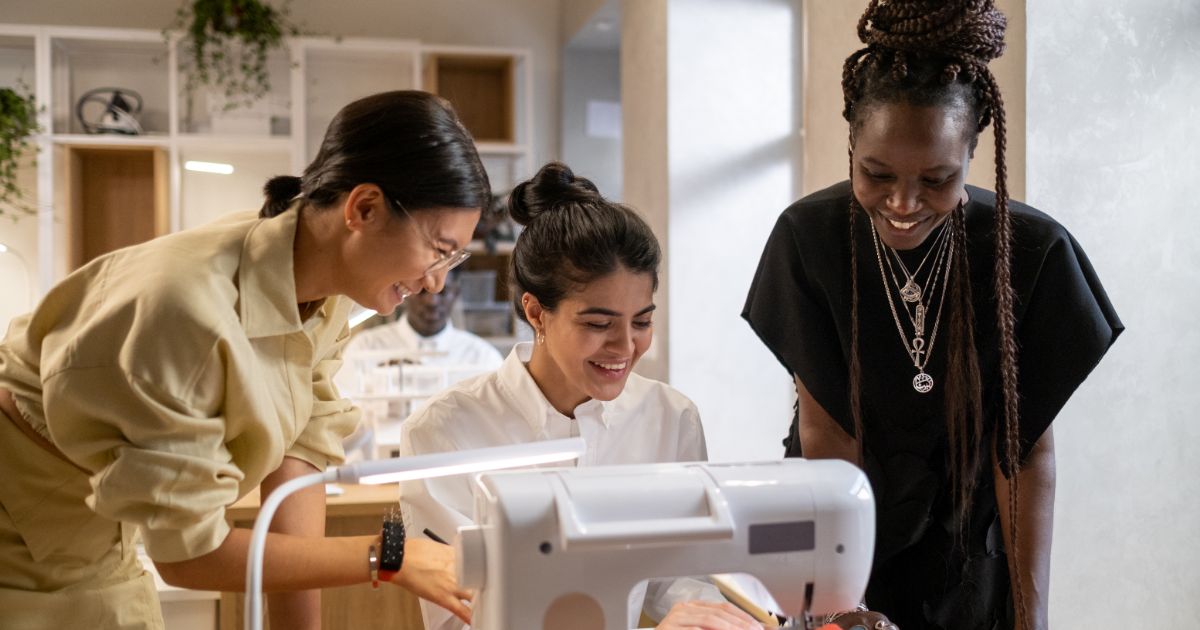How To Become a Fashion Designer in 6 Steps
Have you ever dreamed of seeing your designs gracing the runway or adorning the world's most stylish celebrities? Fashion is a world where creativity meets craftsmanship, where trends are born, and innovation drives style forward. Becoming a fashion designer is not just about sketching pretty dresses; it's about mastering techniques, understanding fabrics, and connecting with your audience through unique expressions of artistry.
This article outlines six essential steps to help you navigate the exciting journey of becoming a fashion designer, from developing your skills to launching your career in the dynamic realm of fashion. Let's explore now!
Step 1: Develop Your Skills and Creativity

If you stay dedicated to improving your skills, pushing creative boundaries to maintaining a passion, you'll pave the way for a rewarding and fulfilling career in fashion design.
Basic Knowledge of Fashion Design
Mastering the basics of fashion design is weighty; this includes understanding garment construction techniques, such as sewing, pattern making, and draping. Familiarizing yourself with various textiles and their characteristics will further enhance your ability to create garments that are not only aesthetically pleasing but also comfortable to wear. Additionally, studying the history of fashion styles provides valuable insights into the evolution of design, helping you to appreciate both classic elements and contemporary innovations.
Drawing and Illustration Skills
A significant aspect of becoming a proficient fashion designer lies in honing your drawing and illustration skills. Regular practice in sketching fashion designs enables you to visualize and communicate your ideas effectively. Experimenting with different artistic styles and techniques allows you to develop a unique aesthetic that sets your designs apart.
Digital Illustration Software
In today's digital age, proficiency in digital illustration software, for example, Adobe Illustrator, facilitates your design process, making precise detailing and professional presentation of your concepts.
Ultimately, becoming a successful fashion designer requires resilience, curiosity, and a willingness to continually challenge yourself creatively.
Step 2: Get Educated
Passion, persistence, and a commitment to lifelong learning are essential for achieving success and making meaningful contributions to the dynamic world of fashion design.
Pursuing Formal Education in Fashion Design
Getting educated in fashion design through a formal program is a critical step toward building a solid foundation in this competitive field. Practical assignments or projects offer hands-on experience, allowing students to apply theoretical knowledge and develop technical skills under the guidance of experienced instructors who often have industry backgrounds. You should research different programs to find one that aligns with your career goals, learning preferences, and gives opportunities for internships or industry placements.
Specialization and Advanced Studies
Beyond undergraduate programs, aspiring fashion designers can pursue advanced studies or specialized courses to enhance their expertise. You can choose master's degrees in fashion design, fashion marketing, or related fields. Short courses and workshops focused on specific techniques or emerging trends also offer valuable learning opportunities, keeping designers updated with industry innovations.
Self-Learning and Skill Development
Complementing formal education, self-directed learning plays a momentous role in a fashion designer's journey. We have endless resources that come from books, magazines, online tutorials.
Step 3: Build a Strong Portfolio

Building a strong portfolio begins with curating a selection of your best design projects that highlight your skills in garment construction, pattern making, and fashion illustration. Variety is key; let's create designs that demonstrate versatility across different styles, themes, or techniques, showing your ability to adapt within diverse fashion contexts. Each piece in your portfolio should display technical proficiency and reflect your unique creative aesthetic.
Creativity and concept development should shine through in your portfolio. These sketches convey your artistic vision and design narrative, showcasing how you conceptualize ideas, so do not be shy to bring them to life through visual representation. Incorporating mood boards that capture your inspiration sources, color palettes, fabric swatches, and other design elements adds depth to your portfolio. They would provide insights into your creative process and aesthetic sensibilities.
Step 4: Network within the Industry
Networking within the fashion industry is indispensable to establishing connections, gaining insights, and advancing fashion designer's careers.
Engage with Industry Events and Networking Opportunities
Attending fashion shows, industry events, seminars, and workshops provides valuable opportunities to meet and connect with professionals, designers, influencers, or potential mentors. These events give you the benefit of exchanging ideas, learning about industry trends, and establishing meaningful relationships within the fashion community.
Build Relationships with Peers and Mentors
Cultivating relationships with fellow designers, fashion students, and industry professionals fosters collaboration, support, and growth opportunities.
Utilize Social Media and Online Platforms
Harness the power of social media platforms like Instagram, LinkedIn, or fashion-specific networks to showcase your portfolio. Besides, it also affects connecting with industry influencers and staying updated on industry news. Engage authentically with followers to expand your network within the industry.
Collaborate and Participate in Fashion Projects
Collaborating with stylists, photographers, models, and other creatives on fashion projects to showcase your design skills in collaborative settings. These collaborations broaden your creative horizons and also expand your visibility.
Step 5: Gain Practical Experience

By pursuing internships, participating in competitions, launching your collections, you can develop a strong foundation of knowledge and skills that will set you apart as a talented fashion designer.
Pursue Internships and Apprenticeships
Internships or apprenticeship opportunities lead you to immerse yourself in the day-to-day operations of fashion design, from sketching to garment construction. Internships also supply insights into industry practices, trends, and the business side of fashion, preparing you for a career as a fashion designer.
Participate in Fashion Design Competitions
Competitions give opportunities to showcase your talent, receive expert feedback, and gain recognition within the fashion community. Winning or placing in competitions can elevate your profile and open doors to future career opportunities or collaborations.
Create Your Own Fashion Collections or Line
Launching your own fashion collections or establishing a fashion label, even on a small scale. It is difficult but powerful, you can gain hands-on experience in every aspect of the design process—from sourcing materials to marketing your designs. Entrepreneurial initiatives demonstrate your initiative, creativity, and business acumen while providing practical insights into the challenges and rewards of managing a fashion brand.
Step 6: Stay Persistent and Adapt
Staying persistent and adaptable are key attributes for aspiring fashion designers navigating the dynamic industry.
Embrace Continuous Learning and Improvement
Fashion trends evolve rapidly, so you must stay updated with industry developments and refine your techniques. Attend workshops, take courses, and seek mentorship to expand your knowledge base.
Navigate Challenges with Resilience
Persistence in fashion design often means facing setbacks, rejection, and criticism. Use these experiences as opportunities for growth and learning rather than obstacles. Develop resilience to bounce back from setbacks, adapt your designs, persevere with confidence in your creative vision.
Adapt to Changing Trends and Consumer Preferences
The fashion industry is driven by consumer preferences. Adaptability as a designer is a combination of understanding market demands, consumer behavior, cultural influences. Stay attuned to shifts in fashion aesthetics, sustainability trends, and technological advancements to meet the evolving needs of your target audience.
Experiment and Push Creative Boundaries
Maintain a spirit of experimentation and creativity in your design process. Explore unconventional materials, techniques, design concepts to differentiate your work and push creative boundaries. Adapting your design style to incorporate new inspirations can set you apart in a competitive market.
Conclusion
Embarking on the path to becoming a fashion designer requires dedication, creativity, and a relentless pursuit of excellence. By following these six essential steps, you can lay a solid foundation for success in the competitive world of fashion.
Remember, every sketch, every stitch, and every connection you make contributes to your growth as a designer. Stay inspired, stay innovative, and let your passion for fashion propel you towards a fulfilling and prosperous career.
Are you ready to embark on your fashion design journey? Skilltrans has useful courses at the most preferential prices. You can register now to steadily step on the journey to conquer your passion.

Meet Hoang Duyen, an experienced SEO Specialist with a proven track record in driving organic growth and boosting online visibility. She has honed her skills in keyword research, on-page optimization, and technical SEO. Her expertise lies in crafting data-driven strategies that not only improve search engine rankings but also deliver tangible results for businesses.



